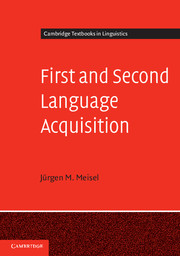Book contents
- Frontmatter
- Contents
- List of figures
- List of tables
- Preface
- List of abbreviations
- 1 The quest for the LAD
- 2 First language development: Universal Grammar as the centrepiece of the human language making capacity
- 3 Obvious (observable) similarities and differences between first and second language acquisition: Developmental sequences
- 4 The initial state and beyond
- 5 Developing grammatical knowledge: Parameter setting and inductive learning
- 6 Neural maturation and age: Opening and closing windows of opportunities
- 7 A (tentative) theory of language acquisition – L1, 2L1 and L2
- Glossary
- Notes
- References
- Index
- References
4 - The initial state and beyond
Published online by Cambridge University Press: 05 June 2012
- Frontmatter
- Contents
- List of figures
- List of tables
- Preface
- List of abbreviations
- 1 The quest for the LAD
- 2 First language development: Universal Grammar as the centrepiece of the human language making capacity
- 3 Obvious (observable) similarities and differences between first and second language acquisition: Developmental sequences
- 4 The initial state and beyond
- 5 Developing grammatical knowledge: Parameter setting and inductive learning
- 6 Neural maturation and age: Opening and closing windows of opportunities
- 7 A (tentative) theory of language acquisition – L1, 2L1 and L2
- Glossary
- Notes
- References
- Index
- References
Summary
Transitional interlanguage grammars?
Investigating parallels and differences between first and second language acquisition from a cognitive perspective inevitably directs one's attention to the role of the LAD as a guiding force of grammatical development. This is the basic idea which I follow in contrasting these two acquisition types, and this is why I presented the quest for the LAD as the principal goal of the current enterprise (cf. chapter 1). The review of some central characteristics of first language development in chapter 2 then led to the conclusion that it is indeed determined in essential ways by the human Language Making Capacity (LMC) of which Universal Grammar is the centrepiece. Following the continuity assumption, this means that the child's implicit knowledge of language contains the same kinds of categories and relations as adult grammars and, importantly, that no component of the child's grammar, at any point of development, violates principles of UG. If this conclusion is correct, it justifies the claim that the LAD determines the developmental logic in L1 acquisition, and it immediately raises the question of whether the same is also true for second language acquisition. Recall from chapter 1 (section 1.2) that interlanguage studies attributed ‘transitional competences’ to L2 learners. Assuming that this is an adequate description of the learners' knowledge, it follows that second language acquisition can also be conceived of as a sequence of approximative systems.
- Type
- Chapter
- Information
- First and Second Language AcquisitionParallels and Differences, pp. 90 - 138Publisher: Cambridge University PressPrint publication year: 2011



